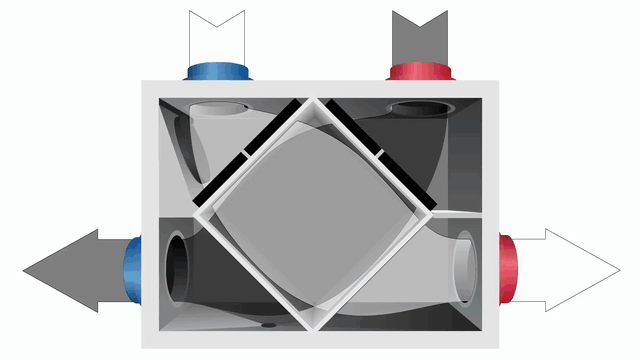What is HRV and ERV?
Both units are Mechanical Ventilators designed to removed stale air from the home while bringing an equal amount of fresh air back inside. Today's energy efficient homes trap stale air indoors, causing poor air quality and potential health problems for you and your family. While Platinum Air Care offers the best filtration products to clean the air, clean air can still become stale air.
By purchasing an HRV/ERV system, you can rejuvenate your home with fresh outdoor air, drawing in fresh oxygen-laden air from outside and distribute it throughout the whole house. Both are installed into the HVAC system so that stale and/or polluted air gets constantly replaced by an equal amount of fresh air ~ while retaining energy so the homeowner does not lose on utility costs.
Heat Recovery Ventilation (HRV)
Heat Recovery Ventilation (HRV) is the most common choice when installing a Recovery Ventilator. A key difference between HRV and ERV is that the HRV is most used in colder weather as it's specifically designed to retain heat inside the home while exchanging air. In the summer the HRV can also work somewhat as a dehumidifier~ removing any extra humidity that you may find entering your home.
Energy Recovery Ventilation (ERV)
The ERV recovers heat like an HRV, but it also helps retain humidity. The ERV helps contains humidity inside your home in the winter, and in the summer helps prevent extra humidity from entering your home or commercial building.
Which Recovery Ventilation Device Is Right For Me?
We Choose The Platinum ERV System
Based on feedback from our customers and manufacturing partner; the best choice in most cases is the Energy Recovery Ventilation (ERV) System. The Platinum ERV System is designed with all seasons in mind, but also capable of transforming into an HRV system without replacing the entire unit; for more information contact Platinum Air Care if converting an ERV to an HRV is right for you.
Frequently Asked Questions (FAQ)
-
Description text goes hereBoth are mechanical recovery ventilation systems, and both are designed to recycle stale indoor air with fresh outside air. The core of the process is the same, but the difference is that the HRV transfers heat while the ERV transfers heat and moisture. We recommend choosing the ERV for year-round use.
-
With minimal maintenance, a quality ERV should last more than 20 years. The main component which may need attention over the years would be the venting as it is typically flexible and soft. It may become brittle or damaged over many years of use (but only if installed poorly, or in an area where the venting can be frequently touched). Thankfully, this is an easy and inexpensive fix.
-
For recycling stale indoor air for fresh outdoor air, an ERV is the best choice for year-round performance.
-
Our default installed setting is for the ERV to run for 20 minutes every hour. This setting can be adjusted with the easy-to-use control pad.
-
As of January 2017, Ontario made having an HRV or ERV a requirement in every newly built home ~ Click here to see the document.
Why Did Ontario Do This?
Our modern homes are built with efficiency standards in mind, tightly sealed homes that retain your heating and cooling better than years before~ however this means that the homes are also more air tight than ever before. Air tight homes are a significant reason why the EPA rates the indoor air to be more polluted inside than outside and why people notice a significant difference in air quality after using our products.
-
Most older homes have had multiple renovations over the years; such as finishing a basement, getting a new roof, replacing your old windows or doors. All of these things can make your home more air tight, which is why Platinum Air Care recommends an having ERV system to improve indoor air quality. This will ensure you have fresh air to rotating in the home regardless if it’s age.
-
No, the air exchange systems are installed in a by-pass configuration much like a HEPA system and run independently.



